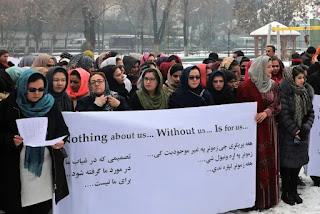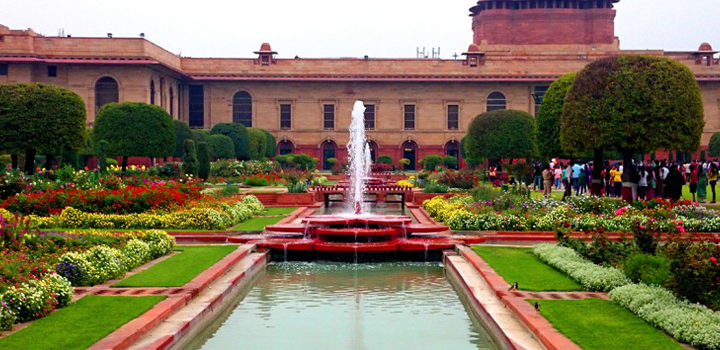As a group of women MPs and women journalists celebrated International Women’s Day in each others company, talking on women struggle to achieve and make their place in the society, some 27 kms away at Tikri at the Delhi borders thousands of farmer women leaving their homes and hearth sat in protest in support of the farmers demands of rolling back the Agriculture Bill from the government. Whatever the difference between the social standing and struggles of the groups the underlying message of women empowerment was common.
Sending a strong message to the women on the occasion of International Women’s Day India’s Finance and Corporate Affairs minister Nirmala Sitaraman asked women not to accept patronizing attitude and insisted that communication should be gender sensitive.
“It is necessary for us to organize ourselves and stand up for the use of the right language for both formal and informal engagement. Most often without intending to harm, people make comments which are patronizing. They don’t realize the implicit gender bias in those utterances made as humor. The language of communication has to be gender sensitive. In Indian languages there are ways to make women related references light heartedly, references like ‘choodiyaan nahi pehni hain’ that reinforce anti-women stereotypes. We have to gently ask for avoidance of such remarks,” said the FM.
“I don’t want anyone to be more accommodative of me because I am a woman. I am an MP, you are an MP. Let us all be MPs. Similarly, talk to me like you would talk to male ministers. Terms of engagement should not change if I am wearing a saree and someone else is wearing pants and shirt,” said the minister.
Acknowledging that she was a beneficiary of the 33 per cent reservation the BJP gave to women in party organisation, the FM asked, “We must probe ourselves and ask whether reservations would be all or whether we need to do something beyond that”.
Patriarchy, gender sensitivity, patronizing, gender imbalance are all tendencies that a woman faces in her day to day life despite the much hype that is made of the International Women’s Day. What about the women who work as daily wagers, as domestic workers, as laborers, as construction workers, even scavengers, does International Women’s Day just pay lip service to them. Not surprisingly we came across hundreds of complaints of women facing domestic violence during the harrowing days of Covid lockdown. Do we even care! Another example….A video is viral on social media talking about how many women, working or non working, are actually and practically aware of or manage their finances…its about financial empowerment too. The stats were shocking. Reality check….even educated women in most cases banked upon their men to take care of their investments, deposits or any other banking options. We call them empowered.
On a solo women travel Facebook page was a revealing survey in which majority of women said traveling alone for women in India was not safe at all. Many went on solo trips without informing their parents as they would in no case agree to their daughters traveling alone or in some cases girls informed them of their solo trip on returning. An unsafe woman is not an empowered woman.
The brighter spot nevertheless was an autorickshaw driver’s daughter Manya Singh see her dream of winning the crown of Miss India 2020 runner-up is true woman empowerment. Our women in the Armed forces, in administration, as pilots, as sailors, as scientists, as lawyers as well as heads of industries give us a ray of hope that things will be better in future and that India is working towards it.
Speaker Lok Sabha Om Birla on International Women’s Day felicitated women for their selfless, dedicated services, sensitivity and empathy in their work attitude. He stated that the 17th Lok Sabha has the 78 women MPs, maximum number as compared to 12 in 1952. Agree. We have surely come a long way since then. But have successive Parliaments passed Women’s Reservation Bill that is often been dumped by political parties of all shades after making tall promises election after election! The Women’s Reservation Bill 2008, is pending in the Parliament of India which proposes to amend the Constitution of India to reserve 1/3rd of all seats in the Lower house of Parliament of India, the Lok Sabha, and in all state legislative assemblies for women. Its still an ongoing fight.
Women still suffer discrimination in pay parity in every field be it corporate, film industry or media with the matter having reached the courts for a level playing field.
Gender inequality within families, inequitable division of labor within households, and cultural attitudes about gender roles further subjugate women and serve to limit their representation in public life. Societies are still highly patriarchal. In terms of women’s inclusion in society, sense of security, and access to justice Norway ranks first, the US ranks 19 out of 167 countries and the lowest is Yemen.
On the yardstick of participation of women on Parliaments across the world a small South African country of Rwanda has maximum representation of women in their lower house with 61.3%, followed by Cuba at 53.4%. United States the most developed and advanced country, the world leader, comes at a poor 67th position with 27.3% women representation. It has lately managed to elect a woman Vice President since its independence. UAE at 50%, New Zealand and Mexico at 48.3% and 48.2% respectively. In Australia women comprise approximately 38% of senators. In 2020, the World Economic Forum listed India at 122 out of 153 countries when it comes to women’s representation in parliament, in their Global Gender Gap Report.
A conservative country like Afghanistan that is still struggling to get out of the throes of terrorism from Taliban boosts of a healthy women empowerment environment. Afghan women work in various layers of decision making positions in the Government of Afghanistan. The proportion of seats held by women in the Parliament of Afghanistan has increased from 4 percent in 1995 to 28 percent in 2018. There are women Cabinet Ministers and Afghan Ambassadors. UAE too has opened up spaces for women giving them equal rights with men.
 International Women’s Day is celebrated worldwide every year on March 8 to recognize the social, economic, cultural and political achievements of women across the globe. This year, the theme for International Women’s Day 2021 is ‘Choose to Challenge’.
International Women’s Day is celebrated worldwide every year on March 8 to recognize the social, economic, cultural and political achievements of women across the globe. This year, the theme for International Women’s Day 2021 is ‘Choose to Challenge’.
We must not let an International Women’s Day be a token celebration gesture in the name of women empowerment. Let women take this opportunity to bring about real change in their lives. It’s the bottom of the societal pyramid consisting of labor women, undernourished mothers, rape and acid attack victims, domestic violence victims and such other needy and powerless women groups facing social and economic inequality and injustice that need upliftment for the realization of a gender equal world. Its as much about equality as its about freedom and opportunities. And women have to make it themselves. Men will not do it for them.
#International Women’s Day, #Women Empowerment, #Women in India, #Gender Equality, #Patriarchy, #Priti Prakash Blog


